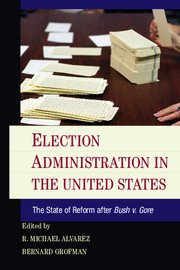Book contents
- Frontmatter
- Contents
- List of Contributors
- Foreword
- Acknowledgments
- Editors’ Introduction
- Part I Bush v. Gore in Perspective
- Part II What Has Changed since Bush v. Gore?
- 4 What Hath HAVA Wrought?
- 5 Voter Confidence in 2010
- 6 Early Voting after Bush v. Gore
- 7 Absentee Ballot Regimes
- Part III Remaining Challenges
- References
- Index
4 - What Hath HAVA Wrought?
Consequences, Intended and Not, of the Post–Bush v. Gore Reforms
Published online by Cambridge University Press: 05 October 2014
- Frontmatter
- Contents
- List of Contributors
- Foreword
- Acknowledgments
- Editors’ Introduction
- Part I Bush v. Gore in Perspective
- Part II What Has Changed since Bush v. Gore?
- 4 What Hath HAVA Wrought?
- 5 Voter Confidence in 2010
- 6 Early Voting after Bush v. Gore
- 7 Absentee Ballot Regimes
- Part III Remaining Challenges
- References
- Index
Summary
The Help America Vote Act (HAVA) was the most important direct federal response to the 2000 electoral fiasco in Florida. HAVA has many provisions, some directly inspired by the controversy, others that came along for the ride. In addition to mandating certain changes in how states conducted federal elections, HAVA appropriated $3 billion for the improvement of voting systems, most of which went to purchase new voting machines.
It is natural to ask whether this was money well spent. Are elections better administered in the United States than before? Have the shortcomings targeted by HAVA improved? It is the purpose of this chapter to address these questions.
But first, we must try to understand what problems HAVA aimed to address and how they were identified as problems in the first place. The Florida recount controversy featured shortcomings of the election system in Florida that almost everyone agreed presented problems, such as inconsistent recount criteria, malfunctioning voting machines, and poorly designed ballots. Specific features of HAVA address these precise problems. At the same time, other issues that did not feature prominently in the Florida drama, such as the difficulty that visually impaired voters had in casting ballots independently, are also addressed by HAVA. Where did these provisions come from, and what does their presence say about the policy process in the realm of election administration?
- Type
- Chapter
- Information
- Election Administration in the United StatesThe State of Reform after Bush v. Gore, pp. 79 - 101Publisher: Cambridge University PressPrint publication year: 2014
- 4
- Cited by



